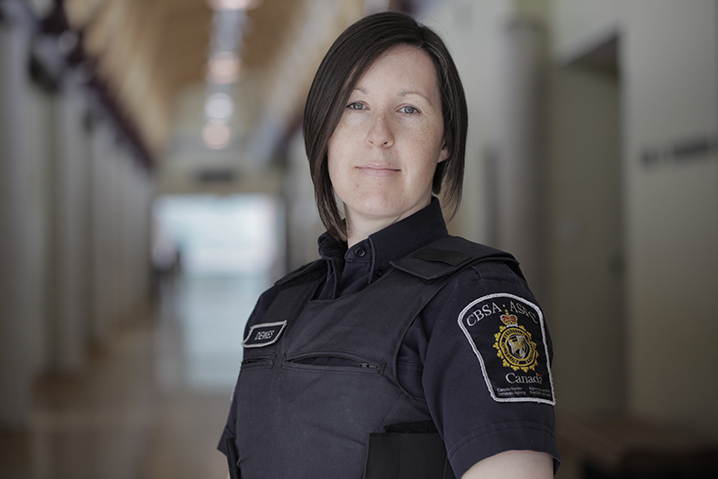Explore Your Options in Law and Justice Studies
You know you want to be in this exciting field, but you’re not sure what specific career area best suits your interests and skills.
Our core Law and Justice programs share a common first semester.
You’ll have the time during the semester to meet individually with program coordinators and upper semester students. They will share their experiences and expertise to help you decide on your pathway.
During your class time, you will be exposed to the many career options available in the different program areas, while you acquire a base of knowledge and fundamental skills that are transferable. Students in our programs can also pursue an INDIGENOUS PERSPECTIVES DESIGNATION (IPD) which provides a more in-depth knowledge of Indigenous (First Nations, Métis and Inuit) peoples, their cultures, histories, traditions and contributions to our shared society. Details are on the college website.
A student who wishes to receive the IPD on their transcript must commit to taking both INDG49 - Introduction to Indigenous Studies, and INDG128 - Indigenous Knowledges, as well as to attending a minimum of four approved co-curricular Indigenous events or experiences.
| Start Here | Take These Courses: | Choose Your Program: |
|---|---|---|
| Common First Semester |
|
How the Common First Semester Works:
Throughout the semester you are guided through the program exploration process. This includes meetings and presentations with coordinators where you will be briefed on program details, professional opportunities for graduates.
At the end of the semester, if you have successfully completed your credits, you are given the option to alter your pathway of study and select an alternate program of choice. If this is done before second semester, there is no cost to make this change and no loss of time will be incurred.
Those students needing to recover some credits will be granted a program change if there is space remaining in the new program selected.

Start with Your Fleming Diploma and add a Degree
The programs within the common semester also have articulation agreements with several universities in Ontario, Canada and Australia. This allows you to start at Fleming, get the benefit of hands-on, applied learning, complete a portfolio, and then move on with advanced standing to university.
These articulation agreements allow you to earn a university degree related to your Law and Justice College studies, in less time and at less cost.
Common First Semester
Explore Your Options in Law and Justice Studies
| Institution/Degree | Credits Earned | Requirements | Qualified Programs |
|---|---|---|---|
| Athabasca University, Bachelor of Professional Arts in Criminal Justice | Up to 60 of a four-year, 120 credits degree | Subject to University Discretion | Customs Border Services Law Clerk Police Foundations Private Security and Investigation |
| Charles Sturt University, Australia, Bachelor of Social Science (Criminal Justice) | 12 of 24 (8 point) credits | Successful Fleming Diploma Completion | Customs Border Services Law Clerk Police Foundations Private Security and Investigation |
| Griffith University, Queensland, Australia, Bachelor of Arts in Criminology and Criminal Justice | Entrance into fourth semester of a six-semester program | 65% GPA average | Police Foundations |
| Justice Institute of British Columbia, Bachelors of Law Enforcement Studies | 60 transfer credits for entry into year 3 of the JIBC’s Bachelors of Law Enforcement Studies (BLES) degree. | JIBC admissions criteria | Police Foundations |
| Royal Roads, Victoria, British Columbia, Bachelor of Arts in Justice Studies Degree | Entrance into the third year of a four-year degree | Subject to University Discretion | Customs Border Services Law Clerk Police Foundations Private Security and Investigation |
| Trent University, Bachelor of Arts (Honours) or Bachelor of Science, Forensic Science | 5 credits of a 20 credit program | 75% Cumulative Average and may be based on availability | Police foundations |
| University of New Brunswick, Bachelor of Applied Management | Entrance into the third year of a four-year degree | A cumulative average of 70%. | Customs Border Services Law Clerk Police Foundations Private Security and Investigation |
| University of Ontario Institute of Technology, Bachelor of Arts (Honours) in Criminology and Justice | 48 of 120 credits granted | Acceptance into the Bridge Program where if student maintains B average with no mark below D will be accepted into the Bachelor program. | Customs Border Services Law Clerk Police Foundations Private Security and Investigation |
| University of Windsor, Bachelor of Social Work or Bachelor of Arts | The equivalent of five credits (one semester) | A cumulative average of B will allow consideration of any credits with a B average or higher. | Custom Border Services Private Security and Investigation |
For More Information about our Common First Semester contact the First Semester Coordinator, Shauna Longmuir at 705-749-5520 x 1213 or shauna.longmuir@flemingcollege.ca